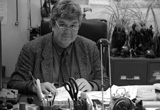 In this new era of GP led NHS commissioning, I saw a young GP on the television. She was interviewed to sample a voice of professional support and enthusiasm for the reformed regime. She spoke with an authoritatively quiet manner and an assured economy of phrase. She said: “GPs know their patients, families, and neighbourhoods.” A think-tank pundit, later in the programme, said much the same. Their views sounded solidly sincere, weighted with the calm dullness of uncontentious fact. On reflection, though, what I heard was specious—optimistic and plausible sounding, but substantially misleading, for GPs’ personal knowledge of patients is increasingly short and shallow.
In this new era of GP led NHS commissioning, I saw a young GP on the television. She was interviewed to sample a voice of professional support and enthusiasm for the reformed regime. She spoke with an authoritatively quiet manner and an assured economy of phrase. She said: “GPs know their patients, families, and neighbourhoods.” A think-tank pundit, later in the programme, said much the same. Their views sounded solidly sincere, weighted with the calm dullness of uncontentious fact. On reflection, though, what I heard was specious—optimistic and plausible sounding, but substantially misleading, for GPs’ personal knowledge of patients is increasingly short and shallow.
Yes, their assertion was once true, yet even then only selectively so: of the better and more vocational GPs, until about 20 years ago. I was mentored by that kind of doctor: they mostly served smaller (than now) practices, full-time, often for several decades. This combination of smallness of scale, ethos of vocation, and length of time-span made much easier certain kinds of personal bonds and understanding: these were dyadic (the doctor and his patient), familial (the patient and their family), and vernacular (their particular world, beyond the family boundary). So, yes, it is true that those kinds of doctors and their patients, in that generation, could more easily develop an informal and often inexplicit understanding of one another. Certainly I witnessed many times how these could, with quiet and subtle patience, lead to gratifying and healing encounters. For about three decades these natural nexuses of healthcare developed—were fuelled by and then created—a vigorous culture of person centred discussion and literature. The Balint movement was a good example of the flowering of this and its subsequent neglect.
The dissolution of this humanly networked healthcare started, then accelerated, from the beginning of the 1990s – the time of the first substantial computerisation and attempts at (internal) marketisation. This rationalisation has had many effects that few had anticipated or intended.
What has this led to? To healthcare far more able with generic management than with personal connection and understanding. True, this is variable and most evident in large (as most now are) hospitals. It may be less true in general practice, but still a serious and growing problem: doctors and patients are increasingly personally unknown to one another.
What does this look like? Often now, GPs do part time, shorter term work in ever larger centres. These populous, busy conurbations are more like the milling milieus of a contemporary airport then the personal refuge of an erstwhile family doctor. In these large health centres doctors engage with a world that has turned increasingly computer-centric: in the waiting room in many surgeries the patient is not now greeted by a receptionist, but by electronic self registration on a touch screen. Then, in the characterless consulting room, the doctor is incrementally yoked to centrally determined, computer designated impersonal tasks, and an endless incoming tide of emails: in this cybersurgery colleagues and other staff become more accessible to electronic signalling than natural conversation. This computer centric abstraction and anomie leaches to patients, too. Consultations often rapidly default to an administratively correct form of data harvesting or officially despatched response. The patient’s unique voice is not really heard, the unspoken not imagined, their face not remembered. The computer may provide images of the abstract that too easily replace other realities.
We lose the myriad and humbly unique personal understandings and investments – and then the gratifications and therapeutic possibilities that can emerge from these. The system may look tidy, but people feel lost … and it is not just the patients.
Yet more trouble awaits us. For the contentious suitability for GPs to lead the commissioning will become more knotted as it evolves. In previous times GPs’ personal knowledge of people and their networks made them a valuable resource to be consulted for planning and management: paradoxically this was then little used. Perversely, now that GPs’ special sentience has almost been destroyed, these semi-blinded, administratively weary GPs are now commanded to manage the planning and management. Whatever little attention and interest GPs are now able to pay to the personal aspects of care will be further displaced and eroded by these new managerial demands. For the more doctors’ heads and diaries are crammed with meetings, e-mails, action lists, data, agendae, pie charts, flow charts, deadlines and algorithms, the less creative and personal attention they can pay to the people who come to them (or themselves).
The GP who is caught in hostile and litigated negotiations about tendered tariffs for hip replacement surgery is far less likely to perceive or understand the significance of the recent death of a cat to a childless, lonely, elderly widow whose husband died last year. Such is a typical scenario from the near future. Care needs certain kinds of imaginative receptivity. The time and space for these are easily crowded out. How do we ensure that the healthcare commissioner does not finally asphyxiate the family doctor?
David Zigmond is a GP in London.
